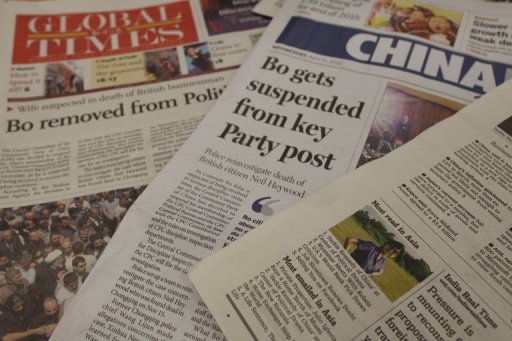A sensational political scandal unfolding in China has exposed the high level of impunity enjoyed by elites at a time when social tensions are rising, highlighting the need for change, observers say.
The affair — which toppled Bo Xilai, one of the Communist Party’s stars, and prompted authorities to probe his wife for murder — has played out in an unusually public manner despite the best efforts of China’s censors.
There have been scant official announcements about the case, but allegations of massive corruption and abuse of power involving Bo and his family have trickled through online to Chinese people already weary of graft scandals.
Bo was sacked from his post as boss of the southwestern city of Chongqing last month, and subsequently suspended from the party’s top-level, 25-member Politburo for “serious discipline violations” — code in China for graft.
His wife Gu Kailai, meanwhile, has been placed under investigation for the suspected murder of a British businessman — a scandal that came to light when Bo’s right-hand man fled to a US consulate and reportedly asked for asylum.
The saga reads like a Hollywood thriller and has gripped ordinary Chinese people, some of whom thought the charismatic Bo was a refreshing change from the country’s stiff, technocratic leaders.
Jiang Weiping, a journalist who was jailed for five years in 2000 after writing articles critical of Bo and Gu, says he caught wind of their corrupt practices in the early 1990s when Bo was propaganda chief of Dalian city.
He alleges that Gu raked in money through initiatives such as setting up a company to facilitate foreign investment in the northeastern city or through donations given to a research institute she established.
Later, their son Bo Guagua was able to study abroad in Britain, where he attended the prestigious Harrow school and then went to Oxford University.
Jiang also alleges that Bo managed to secure his rise through the ranks by giving key officials benefits such as land or tax incentives, thus shoring up high-level support.
After arriving in Chongqing, Bo drew criticism for launching a draconian crackdown on criminal elements in 2009 that led to a series of executions and suicides, amid allegations of widespread torture and false confessions.
The Bo case has been described as the biggest political crisis to hit China in decades, as it exposes deep-set power struggles within the party, although other high-profile corruption cases have also emerged over the past years.
Former Shanghai boss Chen Liangyu, for instance, was jailed for 18 years in 2008 for his role in a pension fund scandal, and former Beijing mayor Chen Xitong was removed from his post in 1995 for corruption and jailed for 16 years.
But China watchers say the economic and social situation is now very different from when those two top officials were convicted, and Bo’s case — while not a trigger — may still bring to the fore the need for reforms.
Much of the party’s legitimacy in recent years has rested on China’s breakneck economic growth — which is able to pull people out of poverty — but this is slowing, and the growth model is becoming unsustainable.
Social tensions are on the rise, with land grabs one of the most volatile issues, triggering violent protests when farmers who have been forcibly evicted from their land have no recourse to legal arbitration.
Cheng Li, an expert on Chinese elite politics and a fellow at the Brookings Institution, says the party needs to make “profound transformations” if it wants to “regain the public’s confidence and remain in power.”
He said in an interview with the US-based National Bureau of Asian Research published Wednesday that there should be a call for widespread legal reforms, intra-party elections for leadership positions, and media openness.

COMMENTS
Please let us know if you're having issues with commenting.